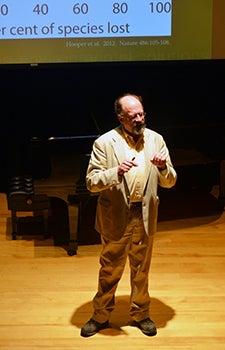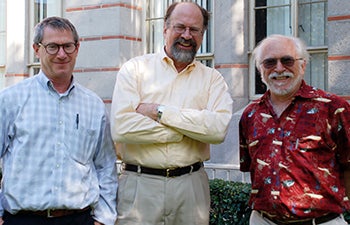Averting the Apocalypse
In 1944, the United States Coast Guard released a herd of reindeer on St. Matthew Island off the coast of Alaska so top naval personnel could hunt them for recreation. The reindeer population grew exponentially. From the 29 creatures initially released during World War II, the island’s reindeer population had reached 6,000 by 1963.
However, by that year’s end, the reindeer had munched their way through all the forage on the island, and virtually the entire 6,000-strong population died from starvation.
“When you have a population growing exponentially in a closed environment, collapse is inevitable when resources run out. That will be us,” warned noted ecologist William Schlesinger. “We can either orchestrate that in some kind of a sensible way, or we can blunder along until it happens.”
The inaugural speaker of the USC Dornsife Sustainability Task Force’s Distinguished Lecture Series, Schlesinger, president of the Cary Institute of Ecosystem Studies, in Millbrook, N.Y., titled his seminar “Four Horsemen of the Apocalypse.”
Speaking to more than 100 faculty, postdoctoral researchers, and graduate and undergraduate students from across the university who had packed into Joyce J. Cammilleri Hall inside the Dornsife Neuroscience Pavilion to hear his lecture, Schlesinger described how human population growth, resource use, growth economics and biodiversity loss are the major obstacles in creating a sustainable future.
The first horseman threatening that future is population growth, Schlesinger said.
“The current human population is above the caring capacity of the planet and, although the growth rate may be slowing, it’s still growing and we need to take that seriously. We can’t sweep the population issue under the rug.
“The solution to this is to have every child on this planet a wanted child,” he said. “We can do that by promoting family planning, empowering women around the world educationally, culturally and economically and by preserving their right to choose. With fewer of us, there is no question that each of us will have a chance at a better life.”

During his lecture, titled “Four Horsemen of the Apocalypse,” William Schlesinger described how human population growth, resource use, growth economics and biodiversity loss are the major obstacles in creating a sustainable future. Photo by Erica Christianson.
The second threat, Schlesinger said, is our emphasis on economic growth.
Each year, the human population extracts fossil fuels from the crust of the Earth equivalent to roughly 400 years of past agro-activity on the planet, Purdue University researchers have determined.
“We are burning every year what the Earth grew in 400,” Schlesinger said. “That fossil fuels pie has finite boundaries to it. We are exploring the edges of that with fracking and other ways of getting at fossil fuels that we couldn’t before, but essentially we are running down a finite resource at the rate of 400 years to one.”
Economic growth, coupled with population growth, has put us on an unsustainable course, Schlesinger said.
“ ‘Anyone who believes that exponential growth can go on forever in a finite world is either a madman or an economist,’ ” he added, quoting early environmental economist Kenneth Boulding.
Schlesinger described his third horseman — resource use — as “riding the waves of greed.”
“There’s no question that we homo sapiens like ‘stuff.’ We want our stuff fast and we assume our children will have yet more it.”
We are not the only ones unwilling to break old habits and make do with less, Schlesinger added. Corporations are also resistant to change.
Citing corporate defense of lead in gasoline, phosphates in detergents and pesticides that adversely affect bees, Schlesinger spoke of the difficulty in changing corporate thinking or behavior once production methods are established.
“Once started, it becomes almost an act of God to get them changed because too many people have a stake in them,” Schlesinger said. “It’s a tough arena when you are trying to say ‘No, this has got to stop,’ when you’re facing a full line of defense attorneys, deep pocketed industries and Darwinian behavior on the part of corporate executives.”
Schlesinger advocated introducing environmental scientists into the corporate decision-making process as soon as possible.
“This is something a school of sustainability could do here at USC — train the kind of people who will be at the decision-making table as a new industry comes in.”
Other issues complicating change include the fact that environmental policies are often seen by politicians as job killers, especially in times of sluggish economic recovery.
Global agreement can also be problematic. To illustrate the argument of those who say we do not have the right to tell sovereign nations how to behave on global issues, Schlesinger told a story.
“There are two men in a rowboat and one begins to drill a hole in the bottom of the boat. The other says, ‘Stop! You can’t do that,’ and the guy with the drill replies, ‘Oh shut up, the hole is under my own seat.’ ”
That, Schlesinger said, is how we often think about our pollution of the global atmosphere if told to stop.

William Schlesinger with Will Berelson, professor and chair of earth sciences (left), and Douglas Capone, chair and Wrigley Professor of Biological Sciences (right). Photo by Susan Bell.
On average, a third of carbon dioxide growth in the Earth’s atmosphere results from population growth and about two thirds from increased resource use.
“Homo sapiens — you and me — have had enormous impact on the chemistry of our planet. This is reflected in the common areas in the atmosphere we breathe, the water we drink, across the whole sweep of chemical elements that are important to us. It is reflected in the pollution of our streams, mercury in fish and the origins of acid rain.”
Schlesinger is a strong proponent of introducing a carbon tax on fossil fuels, arguing that by making non-sustainable resources more expensive than alternative energies, such as wind or solar power, the situation will regulate itself.
“We didn’t end the Stone Age because we ran out of stones but because we thought of something better to do,” he said.
The fourth horseman is biodiversity loss. One third of species present on this planet are likely to become extinct with climate change as a result of losing their critical habitat.
“We should take every effort we can to preserve every species we can to support the biodiversity of the planet,” he said. The literature of ecology is full of examples showing how, as the productivity of ecosystems climbs, the species in those ecosystems are lost.
“I look at a world without wood thrushes or the humpback chub or the pearly mussel, it won’t be as interesting as it is today but it’s also not likely to function in ways I want it to.”
Schlesinger pointed out a gaping hole in our species preservation efforts.
“We punish individual actions, like shooting a protected bird, but not collective actions that are much more threatening to the species we are trying to preserve, but for which no one is obviously to blame.”
While acknowledging that his lecture contained a fair amount of doom and gloom, Schlesinger said the situation was not yet hopeless.
“When the populace puts its mind to it, we can see the results,” he said, citing reduced levels of acid rain in New York due to the Clean Air Act and the gradual recovery of the ozone hole over Alaska.
“It’s not that we can’t do it. We don’t have to throw up our hands in despair. It takes good science, long term studies and a collective will to make it happen.”
William Berelson, professor and chair of the earth sciences department at USC Dornsife and a member of the USC Dornsife Sustainability Task Force headed by Wendy Wood, vice dean for social sciences, helped bring Schlesinger to USC for the lecture.
“A talk like this is motivational if it inspires people from natural sciences, social sciences and even the humanities to get involved in the sort of real cross-disciplinary activities we would like to see in this area,” Berelson said.